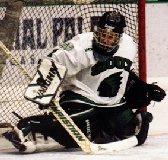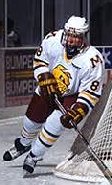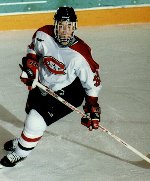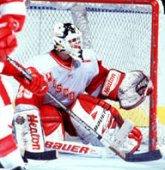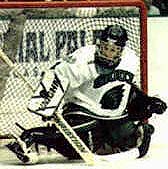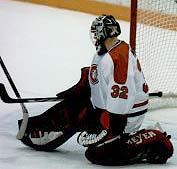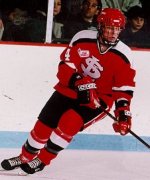There was a point last season where Minnesota found out, all too clearly, that it may have been leaning on goaltender Adam Hauser.
That’s when it all came crashing down.
The Golden Gophers, on their way to home ice in the first round of the WCHA playoffs, got smacked square in the face when they learned Hauser had mononucleosis four games from the end of the regular season. The goaltender missed all four games.
The result? Loss, loss, loss, loss and a trip to Colorado Springs for the playoffs.
This year, Minnesota coach Don Lucia is vowing that won’t happen again — the leaning on Hauser, not the mono. That responsibility won’t just fall on the defense.
“It has to be a team effort,” said Lucia, entering his second season in Minneapolis. “We gave up far too many shots on goal last year. We have to cut that down.”
The Gophers allowed 32.5 shots per game, two-plus more than they unleashed.
The defense won’t be competely responsible for seeing through a reduction in shots, but the corps will have a lot of eyes on it. Glaring mistakes at crucial times cost Minnesota last year, and Lucia hopes a new addition and the maturation of the returners will stabilize things on the blue line.
Freshman Paul Martin, a 6-foot, 171-pound 19-year-old, will probably come into the season among the top six defensive players, Lucia said. But no spot appears safe on the Gophers’ blue line.
“All of a sudden, somebody who played regularly at the end of last year gets moved out of the lineup, so I think that’s going to put more pressure on some people to perform,” Lucia said. “We were young back there (last year). We were playing a lot of times three sophomores and two freshmen. You hope that experience they were able to get last year, and they’re bigger and stronger after a summer in the weight room, will pay off into playing better this year.”
Lucia said he expects Martin, Jordan Leopold, Dylan Mills and Matt DeMarchi to be the top four on defense. From there, it’s open. While Mills, the lone defensive senior on the team, has a lot of the leadership load on his shoulders, his biggest impact might be felt on the power play.
The Gophers were first in the league at 27.3 percent last year and had three of the top four power-play scorers in the league. Mills was tied for fifth in the league with 18 power-play points.
And the man advantage is an area the Gophers need to carry over from last year’s team.
“If the power play can be as good as last year, I’ll be happy,” Lucia said. “If we can lead the league again, that’s a good thing.”
But they lost Nate Miller, who tied for the team lead with 10 power-play goals.
“I think we have to find somebody to [fill] that spot in front of the net, that’s going to take a beating and go get some loose pucks,” Lucia said. “It’s not a glamorous role, but [Miller] was very effective last year in that position and once we put him there, our power play got better.”
Five on five, the offense has a number of familiar names — Aaron Miskovich, John Pohl, Erik Westrum, etc. — but Lucia is more concerned about the players without the name recognition.
"It’s just easier in year two because I now have a better sense of what the players are all about, and they probably have a better sense of what I’m all about."
— Minnesota head coach Don Lucia
You know: Pat O’Leary, Nick Anthony, Stuart Senden. Don’t feel too bad if those names are new to you. Lucia just hopes they won’t be by the time the year is over.
“For us this year, it’s not just a core seven guys. To me, it’s that next tier that’s ultimately going to determine what kind of year we have,” Lucia said. “I’m confident that Adam [Hauser’s] going to play well and we’re going to get a good year from Jordan [Leopold] and Dylan Mills and Pohl and Westrum and Miskovich.
“It’s who’s going to be in that next tier of players that’s going to score 10 or 12 goals for us. We have to score five on five; our specialties were real good last year; now can some guys take a jump in their development and go from scoring a half dozen goals to 12 goals?
“I think Senden can do a little bit more — he scored some big goals last year. I think Nick Anthony can take another jump. Pat O’Leary had six goals and showed promise; now he’s a junior and it’s make-or-break time.”
Is it make-or-break time for Lucia? Minnesota fans have a bit of patience, but it does wear thin quickly when they see rivals like Wisconsin win all five games in the season series, like the Badgers did last year.
But Lucia said he’s more comfortable starting this year than the last.
“It’s just easier in year two because I now have a better sense of what the players are all about, and they probably have a better sense of what I’m all about,” he said. “You just don’t have a sense to put people in certain positions and it takes a while to figure out what the guys are all about.
“I know the routine now. The first half of last year, I felt like I was being tugged in a million directions, not only at work but at home, trying to get your wife and kids adjusted to a new area. For them, the transition is over and I understand the demands. There’s no question the demands here are greater than what they were when I was at CC.”
The Schedule
Minnesota will get an opportunity early to show how serious it is about winning the MacNaughton Cup this year. After series with Minnesota-Duluth and Alaska-Anchorage, the Gophers host Wisconsin, travel to North Dakota and have a home-and-home with St. Cloud State.
We will probably know then if Lucia’s second year will go better than his first. If the Gophers show their strength during this period, they could put themselves near the top of the league to stay.
“We’re going to find out where we’re at in a hurry in the month of November,” Lucia said. “We have to do better against the teams that are ahead of us. Last year against North Dakota, Wisconsin and St. Cloud, between them I think we only won one game. [The Gophers beat North Dakota but also tied the Sioux and St. Cloud.] And that’s kind of why we finished where we did. We beat the teams below us and didn’t beat the teams in front of us.”
Et Cetera
One of these things is not like the other. That’s Grant Potulny, the lone non-Minnesotan on the roster. He has the potential to be a story before he steps on the ice for his first game, but Lucia is trying to prevent that.
“I’m not going to make it a story,” he said. “Maybe for some people it’s a bigger issue than it is. To me, he’s just a hockey player at the University of Minnesota.
“It’s a team deal and I don’t want to pull any one person out. Grant’s no different than any other player. I’ve always said that I want people to cheer for the University of Minnesota. And once you put the sweater on, that’s who you are. There’s been a lot of great players here, some of our All-Americans, that have been Canadians and there’s nothing wrong with that.”
But talk about adding fuel to the rivalry fire? Potulny, the first non-Minnesotan to play for the Gophers since before the Doug Woog era, is from Grand Forks, N.D. That’ll be quite a homecoming on Nov. 10 and 11.
